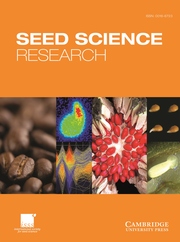Article contents
The expansin EXP1 gene in the elongation zone is induced during soybean embryonic axis germination and differentially expressed in response to ABA and PEG treatments
Published online by Cambridge University Press: 27 November 2020
Abstract
During soybean seed germination, the expansive growth potential of the embryonic axes is driven by water uptake while cell wall loosening occurs in cells from the elongation zone (EZ). Expansins are regarded as primary promoters of cell wall remodelling in all plant expansion processes, with the expression profiles of the soybean expansins supporting their cell or tissue specificity. Therefore, we used embryonic axes isolated from whole seed and focused on the EZ to study seed germination. Using a suite of degenerate primers, we amplified an abundantly expressed expansin gene at the EZ during soybean embryonic axis germination, which was identified as EXP1 by in silico analyses. Expression studies showed that EXP1 was induced under germination conditions in distilled water and down-regulated by abscisic acid (ABA), which inhibits soybean germination by physiologically restraining expansion. Moreover, we also identified a time window of ABA responsiveness within the first 6 h of incubation in water, after which ABA lost control of both EXP1 expression and embryonic axis germination, thus confirming the early role of EXP1 in the EZ during this process. By contrast, EXP1 levels in the EZ increased even when germination was impaired by osmotically limiting the water availability required to develop the embryonic axes’ growth potential. We propose that these higher EXP1 levels are involved in the fast germination of soybean embryonic axes as soon as water availability is re-established. Taken together, our results show strong EXP1 expression in the EZ and postulate EXP1 as a target candidate for soybean seed germination control.
Information
- Type
- Research Paper
- Information
- Copyright
- Copyright © The Author(s), 2020. Published by Cambridge University Press
References
- 10
- Cited by


